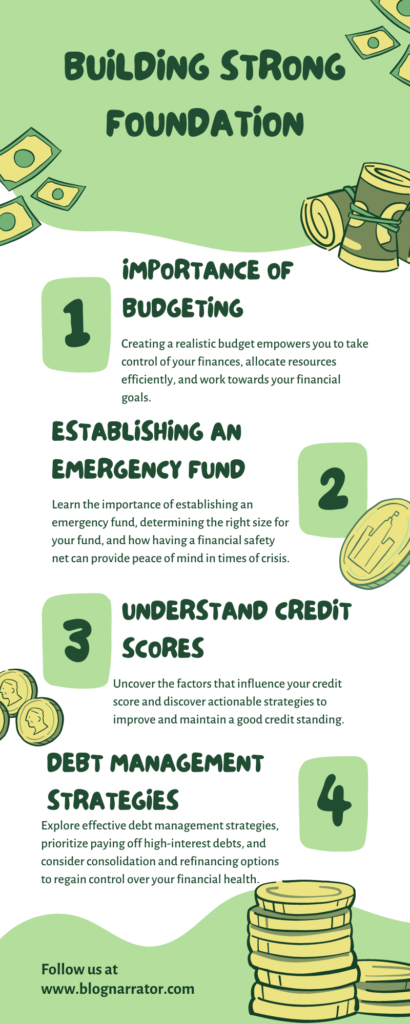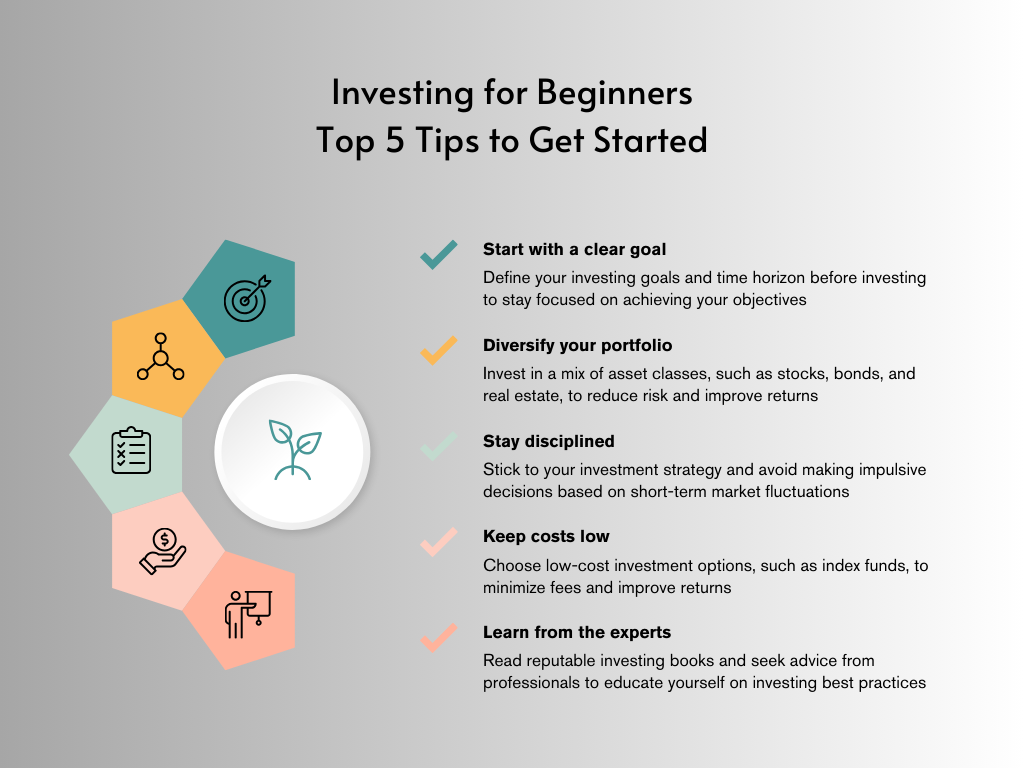Personal Finance
In a world driven by financial complexities, mastering your personal finances is not just a desirable skill; it’s a necessity for building a secure and prosperous future. Personal finances refer to the management and allocation of an individual’s or a household’s financial resources. It encompasses a range of activities, decisions, and strategies aimed at achieving financial goals, maintaining financial stability, and securing long-term financial well-being. Let’s begin with practical insights and actionable strategies to help achieve financial wellness.
I. Building a Strong Foundation
- Importance of Budgeting: At the core of sound financial management is the art of budgeting. Creating a realistic budget empowers you to take control of your finances, allocate resources efficiently, and work towards your financial goals. Budgeting principles is one of the most important steps of personal finance.
Establishing an Emergency Fund: Life is unpredictable, and financial emergencies can strike when least expected. Learn the importance of establishing an emergency fund, determining the right size for your fund, and how having a financial safety net can provide peace of mind in times of crisis.
Understanding Credit Scores: Your credit score is a crucial element in your financial journey. Uncover the factors that influence your credit score and discover actionable strategies to improve and maintain a good credit standing. Understanding how credit works is essential for making informed financial decisions.
Debt Management Strategies: Many individuals grapple with debt, but strategic management can lead to financial freedom. Explore effective debt management strategies, prioritize paying off high-interest debts, and consider consolidation and refinancing options to regain control over your financial health.

II. Investing for Beginners
Introduction to Investment Vehicles: Delve into the world of investments by understanding various vehicles such as stocks, bonds, mutual funds, and exchange-traded funds (ETFs). Learn the basics of each investment option and how they can align with your personal financial goals.
Risk vs. Reward: Finding Your Comfort Zone: Balancing risk and reward is a key aspect of successful investing. Discover how to determine your risk tolerance, build a diversified investment portfolio, and navigate the delicate equilibrium between risk and potential returns.
Long-Term vs. Short-Term Investments: Create your investment strategy based on your financial goals. Whether you’re looking for long-term growth or short-term gains, this helps you with insights into aligning your investment approach with your aspirations.

III. Mastering the Art of Saving
Creating a Savings Plan: Savings are the cornerstone of personal finance stability. Develop a savings plan that aligns with your goals, whether it’s for an emergency fund, a major purchase, or long-term wealth-building. Explore strategies to consistently save and make your money work for you.
Automated Savings Strategies: Explore the benefits of automating your savings. Leveraging technology to set up automatic transfers ensures that you consistently contribute to your savings without the need for constant manual intervention.
Cutting Expenses Without Sacrificing Quality of Life: Achieving financial goals doesn’t always mean sacrificing your lifestyle. Uncover practical tips for reducing everyday expenses, identifying non-essential spending, and optimizing your spending habits without compromising on quality of life.
The Power of Compound Interest: Learn the magic of compound interest and understand how it can accelerate your wealth accumulation. Compound Interest allows exponential growth potential of consistent savings over time.
IV. Navigating the Credit Card Game
- Choosing the Right Credit Card: Credit cards can be powerful financial tools when used wisely. Learn how to choose the right credit card for your needs, considering factors such as rewards, interest rates, and fees.
Building and Maintaining Good Credit: Your credit history is a reflection of your financial responsibility. Practice best practices for establishing and maintaining good credit, understanding how it impacts your personal finance.
Avoiding Credit Card Pitfalls: While credit cards offer convenience, pitfalls can lead to financial challenges. Discover strategies to manage credit card debt responsibly, avoid common pitfalls, and use credit cards as a tool for your personal financial success.
Maximizing Rewards and Cashback: Make the most of your credit card usage by maximizing rewards and cashback benefits. Uncover tips and tricks for optimizing your credit card usage to earn valuable perks.

V. Retirement Planning
Understanding Retirement Accounts: Understand the landscape of retirement accounts, including 401(k)s, IRAs, and other options. Gain insights into the features, benefits, and considerations of each account to make informed decisions about your retirement savings.
Setting Realistic Retirement Goals: Crafting realistic retirement goals involves understanding your financial needs and aspirations. Learn how to calculate your retirement needs, set achievable goals, and create a plan to work towards personal financial security in your golden years.
Importance of Early Retirement Planning: Time is a critical factor in retirement planning. Explore the impact of early contributions on retirement savings and understand why starting your retirement plan sooner rather than later is advantageous.
Strategies for Catching Up on Retirement Savings: For those who may have started later, catching up on retirement savings is still possible. Discover effective strategies for increasing your retirement savings, even if you’re behind on your initial plan.
VI. Real Estate and Wealth Building
Buying vs. Renting: Pros and Cons: Deciding whether to buy or rent a home is a significant financial decision. Explore the pros and cons of each option to make an informed choice based on your current situation and future aspirations.
Real Estate Investment Strategies: Real estate can be a powerful wealth-building tool. Delve into various real estate investment strategies, from rental properties to real estate investment trusts (REITs) and understand how they align with your financial goals.
Tips for First-Time Homebuyers: Starting on homeownership for the first time? Receive guidance on navigating the complexities of purchasing your first home, from securing a mortgage to understanding the associated costs.
Home Equity and Wealth Accumulation: Understand how home equity can contribute to your overall wealth. Learn strategies to leverage home equity responsibly and how it can become a valuable asset in your financial portfolio.
VII. Financial Literacy for Kids
Importance of Early Financial Education: Financial literacy is a gift that keeps giving. Recognize the importance of introducing financial concepts early in life and setting the stage for a lifetime of responsible money management.
Fun and Engaging Ways to Teach Kids About Money: Make financial education enjoyable for kids. Explore interactive games such as (Monopoly, Cash Flow), activities, and resources that instill important money management skills in a way that captures children’s interest.
Setting up Allowances and Savings Accounts: Teaching kids about money involves practical lessons. Learn how to set up allowances, introduce the concept of earning and saving, and establish savings accounts to nurture a culture of financial responsibility.
Preparing Kids for Financial Independence: As children grow, prepare them for financial independence. Discover strategies for gradually increasing financial responsibilities, guiding them through major financial milestones, and instilling a sense of confidence in managing their finances.
VIII. Side Hustles and Additional Income Streams
Exploring Side Hustle Opportunities: Dive into the world of side hustle and explore various opportunities to generate additional income. From freelance work to online ventures, discover options that align with your skills and interests.
Passive Income Ideas: Passive income streams can offer financial flexibility. Explore passive income ideas, from investing in dividend-paying stocks to creating digital products and understand how they can complement your primary income.
Balancing Multiple Income Streams: Effectively managing multiple income streams requires organization and strategy. Learn tips for balancing various sources of income to ensure stability and optimal financial results.
Tax Considerations for Additional Income: Understand the tax implications of additional income streams. Explore tax considerations for side hustles and passive income and discover strategies to optimize your tax position.
IX. Navigating Student Loans
Understanding Different Types of Student Loans: Student loans are a reality for many. Differentiate between federal and private student loans, understand the terms and conditions, and make informed decisions about your education financing.
Student Loan Repayment Options: Explore various student loan repayment options available. From income-driven repayment plans to refinancing, understand the choices that align with your financial circumstances and goals.
Strategies for Paying Off Student Loans Faster: Accelerate your journey to debt-free living by employing effective strategies for paying off student loans faster. Discover methods to reduce interest costs and expedite your path to financial freedom.
Planning for Student Loan Forgiveness: Understand the criteria for student loan forgiveness programs. Explore eligibility requirements, application processes, and potential avenues for having a portion or the entirety of your student loans forgiven.
X. Continuous Analysis and Optimization
Regularly Analyze the Performance of Your Financial Strategies: Financial management is an evolving process. Learn how to regularly analyze the performance of your financial strategies, assess the effectiveness of your investments, and make data-driven decisions for continuous improvement.
Making Data-Driven Decisions for Continuous Financial Improvement: Incorporate data-driven decision-making into your financial journey. Understand how to interpret financial data, identify areas for improvement, and adjust your financial plan based on real-time insights.
Adjusting Goals and Plans Based on Life Changes and Market Conditions: Flexibility is key in financial planning. Explore how to adapt your goals and plans based on life changes, such as career shifts or family milestones, and understand the impact of market conditions on your financial strategy.
Conclusion
Questions
- What is the #1 rule of personal finance?
What are the three C’s of personal finance?
What are the four simple habits for personal finance success?
What is the 10% rule in personal finance?
What are the 5 areas of personal finance?
Personal Finance Books
Rich Dad Poor Dad by Robert T. Kiyosaki
Think and Grow Rich by Napoleon Hill
The Intelligent Investor by Benjamin Graham
The Richest Man in Babylon by George S Clason
Complete Guide to Money by Dave Ramsey
If you find this article insightful and want more valuable content, consider following us for regular updates on personal finance and other related topics. Together, we can embark on a journey toward financial knowledge and success.

